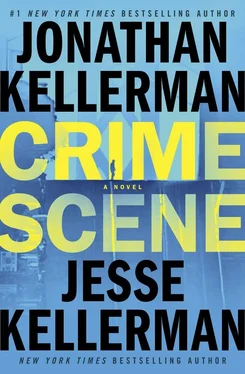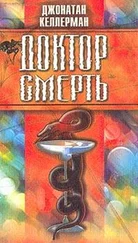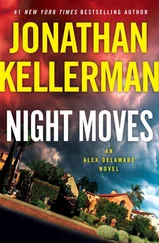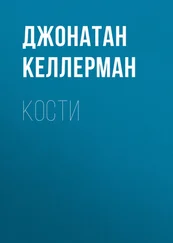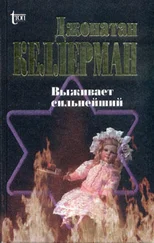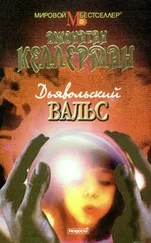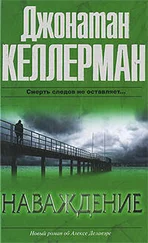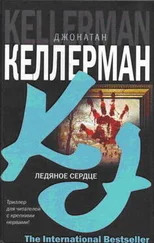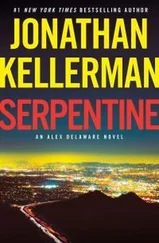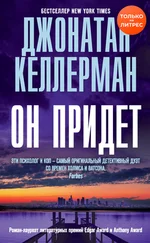“Yes sir, I understand. I appreciate your assistance.”
“Have a good day, Mr. Afton.”
“You too, Deputy.”
I rang off. I felt tired.
With the browser still open, I searched for the doctor who’d written Rennert’s prescription for Risperdal.
I expected a psychiatrist. Maybe an internist.
I did not expect that Louis Vannen, MD, would run a urology practice in Danville.
The internet yielded plenty of off-label uses for risperidone — depression, OCD, PTSD — but none that targeted areas below the neck, let alone the belt.
I craned around to address my deskmate. “Hey Shoops.”
Our fourth DC, Lisa Shupfer, hunkered down opposite me, hiding in her screen, pointedly ignoring the debate raging over low-fat versus low-carb. “Mm.”
“You ever heard of a urologist prescribing Risperdal?”
“Urologist?”
“Yeah. Some condition I’ve never heard of.”
Shupfer shook her head. “Ask Dr. Bronson, he’ll know.”
“He left for the day,” Daniella Botero said. “It’s his son’s birthday.”
Moffett said, “Know what?”
“My decedent was taking Risperdal,” I said.
“He kept it with his liquor,” Zaragoza said.
“He needs psych meds,” I said, “why isn’t he going to a psychiatrist?”
“Maybe he was ashamed,” Shupfer said.
A fair point.
“Maybe his penis was delusional,” Moffett said.
“Find one that isn’t,” Daniella Botero said.
I spent most of Sunday at my desk. Samuel Afton called three times with updates. He’d given up on his stepfather’s nephew but had obtained the name of a cousin in El Paso.
I said that sounded promising.
I attacked my backlog, did crappy EDRS cases, and filled out as much of the Rennert case narrative as I could, leaving voicemails for Drs. Gerald Clark and Louis Vannen.
The following Wednesday I came to work to learn that Walter Rennert’s autopsy had been completed on Monday afternoon. I’d guessed AMI, and while I was off about the precise cause of death, my hunch that we were looking at a cardiac event proved correct. If anything, the pathologist’s finding was more conclusive: rupture of the aorta, brought about by acute aortic dissection.
The largest blood vessel in Rennert’s body had basically exploded. No going back from that.
I wondered how Tatiana would react to the news.
Not well, I suspected. There’s often an inverse relationship between intelligence and adaptability. Smarter people — and Tatiana seemed smart enough — tend to dig in harder, largely because they can. They have the resources to draw on. They comb the internet for talking points. They can produce a million arguments for why I am wrong, why I must be wrong. They can sound awfully convincing. The more supple the brain, the more easily it’s enslaved by that furious bloody little dictator, the heart.
I remember a mother and father in Piedmont whose teenage daughter died shooting a hot dose. By all appearances, they were upstanding folks: educated, professional, and — as far as they were concerned — involved in their children’s lives. In short: totally unequipped to cope with the gash in their reality.
For months they kept calling the office, pleading with and eventually screaming at me to manner it a homicide. They did the same to the cops, demanding the arrest of the unknown dealer. Over and over I had to explain to them that, in the eyes of the law, the death was an accident. I felt like some cruelly defective vending machine, spitting out their dollar again and again. And I’ll admit that I came to resent them a bit for forcing my hand, for making me reopen their wound.
In the eyes of the law, Walter Rennert had died naturally. I needed the final autopsy protocol to close out the case, but based on the finding and my own notes, I had more than enough to manner it and issue a death certificate.
I found it disturbing, then, to realize that a corner of my mind had begun exploring other avenues, ones more pleasing to Tatiana.
That I could entertain such thoughts underscores the inherent murkiness of the process. Where’s the starting point? How do you decide? These questions apply at every juncture, but they feel especially relevant when you’re talking about death, the end result of all prior causes.
A hot dose kills you. So does the decision to try heroin. Same for the history that leads to that decision. Family. Friends. Experience. Coincidence. I can understand how bringing a child into the world might make you feel responsible for everything that follows. I can understand why you’d prefer to blame the dealer.
Five manners of death, and that’s by design. Restricting ourselves to a few choices, we prevent philosophical thumb twiddling. The mercy of a death certificate lies in its limitations. It omits reference to your choices, big or small. It puts a cap on the past. It says This is what you need to know about what happened.
With few exceptions, its judgment stands forever. It’s important to get it right, both for the dead but more so for the living.
Say I were somehow able to nudge Walter Rennert’s manner from natural to accidental. Would that satisfy Tatiana? I doubted it. The story she was writing was about a homicide. It was fiction. I opened up my case narrative and began to type.
An hour into my work, I got a call from Gerald Clark, MD.
Clark had been Rennert’s primary physician for three decades, and his demeanor reflected the length and nature of their relationship. He confirmed Rennert’s history of hypertension, sounding saddened but unsurprised by the autopsy finding.
“The drinking was the main issue,” he said. “Everything else flowed from that, so to speak. It gives you an idea of how much he drank, that he could play tennis all the livelong day and still be overweight.”
“His daughter made it sound like he was more of a casual player.”
“You’ve obviously never seen him on the court,” he said. “He belonged to the Berkeley Tennis Club. I happened to be there once, meeting a friend. We sit down at the bar, and out the window, lo and behold, there’s Walter, running around like a madman, rivers of sweat, red in the face. I mean bright red. He looked like a goddamn gummy bear. It was all I could do not to go toss a bucket of water on him. The next time he came into my office, I said, ‘Walter, you’re not more careful, you’re going to kill yourself.’ ”
“What did he say to that?”
“He just laughed and told me to mind my own business.” Clark laughed himself, at the memory. “He didn’t look like he was having much fun out there. Frankly, he looked miserable. I told him that, too. ‘Why don’t you take up something more relaxing? Swim.’ He could be very stubborn.”
“Was he depressed?”
“I never treated him for depression.”
“That doesn’t mean he wasn’t.”
Clark sighed. “Did I think he was a happy person? No. He’d been through one hell of an ordeal.”
“By ‘ordeal’ you mean...”
“With the university.”
“His daughter mentioned a test subject of his who killed a girl,” I said. “I’m a little hazy on the details.”
“There’s not much else to know. It was a fiasco, and not only because of what happened to the victim. The fallout was awful. Her family sued the school, who forced Walter out. Of course, he blamed himself.”
It ruined him.
Perhaps feeling he’d overstepped, Clark said, “I’m not telling you anything that isn’t public knowledge. It was all over the news. You can imagine the effect it had on him. I wanted to write him a prescription for Prozac. He wouldn’t take it. I said, ‘Find someone to talk to, at least.’ He wouldn’t hear of it. ‘I know psychologists, I am a psychologist, I don’t want to talk to a psychologist.’ Stubborn. But, look, Deputy, I’ve known Walter a long time. Even before any of that happened, he wasn’t exactly an optimist.”
Читать дальше
